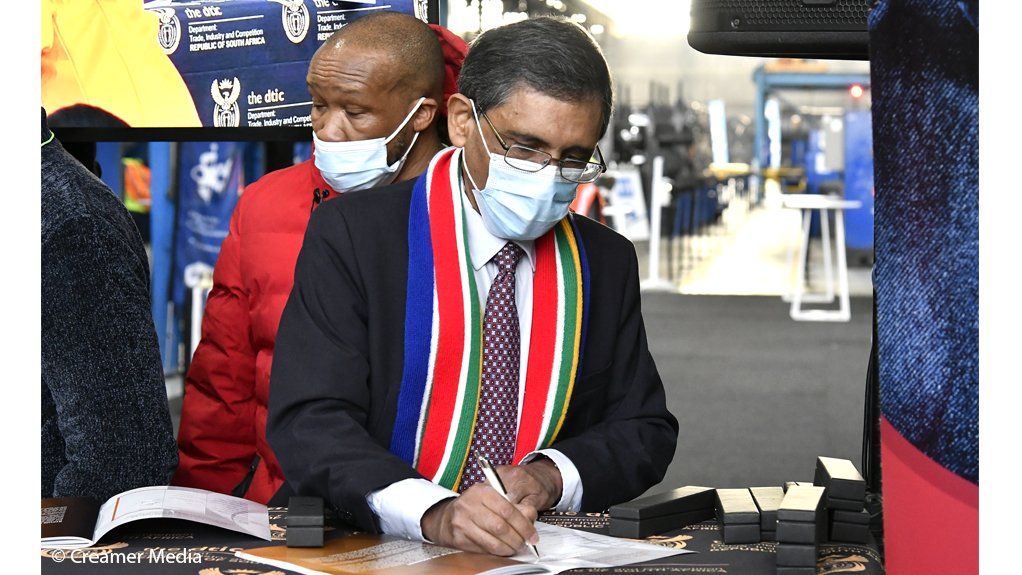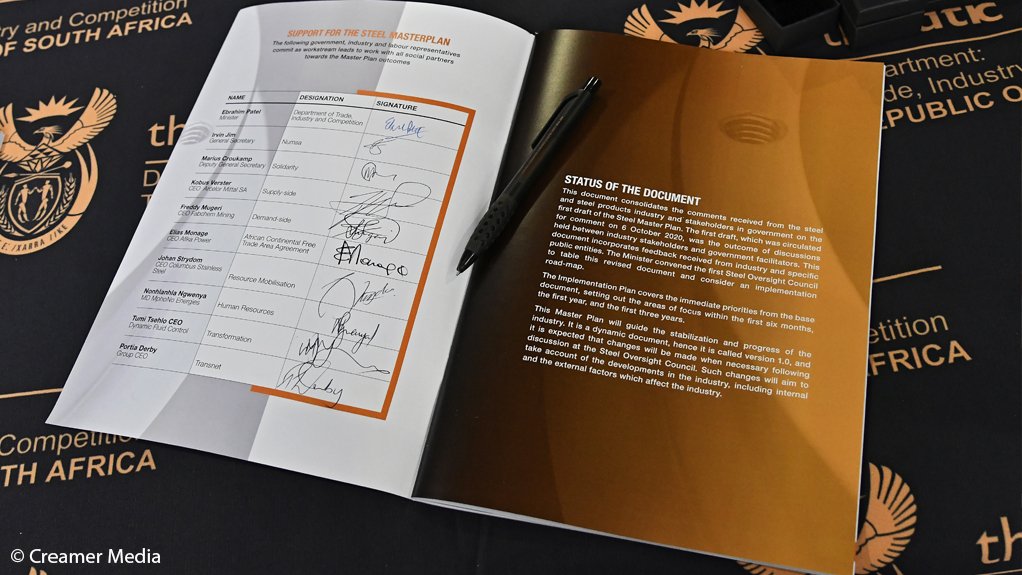Infrastructure and import substitution at heart of new master plan’s vision for steel revival



Trade, Industry and Competition Minister Ebrahim Patel outlines the main pillars of the Steel Industry Master Plan at a signing ceremony held at Hall Longmore’s factory in Wadeville, in Gauteng. Camera Work: Kutlwano Matala. Editing: Nicholas Boyd.
Trade, Industry and Competition Minister Ebrahim Patel signs the Steel Master Plan as Numsa's Irvin Jim prepares to do likewise
Photo by Creamer Media's Donna Slater
Signature on the Steel Master Plan
Photo by Creamer Media's Donna Slater
A new master plan aimed at stabilising South Africa’s steel industry and creating a platform for the revival of the country’s embattled downstream steel fabricators was signed by representatives from business, labour and government on Friday.
The ceremony, which took place amid the constant hum of heavy machinery at Hall Longmore’s factory in Wadeville, in Gauteng, was addressed by Trade, Industry and Competition Minister Ebrahim Patel, who said a new partnership was required if South Africa was to rebuild a “strong, competitive and job-rich steel industry”.
Titled ‘The South African Steel and Metal Fabrication Master Plan 1.0’, the 80-page document has been published following nearly two years of “robust” talks, facilitated by Dr Bernie Fanaroff, the former trade unionist and leading post-apartheid government administrator, who also played a prominent role in South Africa’s successful bid to co-host the Square Kilometre Array project.
It has also been signed against the backdrop of serious Covid-linked steel supply backlogs, as well as growing frustration within the sector over ongoing tariff protection for ArcelorMittal South Africa, which was among the signatories to the master plan, and recent steep price hikes implemented by the company.
Patel said the masterplan did not represent an end to all tensions in the industry, but rather an effort on the part of a “critical mass” of industry stakeholders to tackle ongoing deindustrialisation, as well as the constraints to future growth and employment in the sector.
Barnes Group director Doron Barnes, whose company acquired steel pipe manufacturer Hall Longmore from Murray & Roberts in 2014, said he had already witnessed first-hand the power of collaboration, with government’s intervention having played a key role in averting the closure of Hall Longmore and having its equipment relocated to Nigeria.
“It is always easier to complain, blame and criticise rather than to put in a meaningful effort to create sustainable solutions,” Barnes said in his address on the factory floor, adding that the master plan created the platform to “map a way forward” with the support of government.
The plan has been developed on three pillars, namely:
- boosting demand for steel and steel products, primarily by reviving South Africa’s stalled public infrastructure roll-out, driving localisation or import substitution and by leveraging the market access being created through the implementation of the African Continental Free Trade Agreement;
- addressing supply-side constraints, including electricity disruptions and tariff hikes, logistics bottlenecks, uncompetitive inputs and inadequate skills and research and development; and
- a series of cross-cutting interventions, including the creation of a Steel Industry Development Fund, to be capitalised through the introduction of a levy of between R5/t and R10/t on all steel sold domestically, whether it be produced locally or imported.
STEEL FUND
Patel said the details of the fund were still being finalised, but indicated that there was no intention of channelling the money through government and that it would be administered by the industry itself.
A multi-stakeholder Steel Oversight Council had been established to oversee the implementation of the master plan and the fund.
Patel stressed that fiscal transfers, in the form of an incentive, were not viewed as a fundamental driver for reviving the sector.
“It’s going to be about increasing domestic demand for steel. That can and must be a more significant way in which the State can support local industry than by making R1-billion available through concessional funding,” he explained.
“The big gains will be made by moving our infrastructure programme from shallow waters to deep waters and to get it moving on a bigger scale and then introducing a localisation requirement not only on primary steel, but also downstream steel.”
Patel reiterated his argument that, at 25% of gross domestic product, imports were playing a disproportionate role in the South African economy and that there was scope for higher levels of localisation, including localisation of steel and metal products.
An accord had, thus, been reached at the National Economic Development and Labour Council to drive progressive localisation of up to R200-billion of additional production over a five-year period.
National Union of Metalworkers of South Africa general-secretary Irvin Jim, who put his signature to the master plan, argued that the steel industry needed to begin casting its mind beyond being in “survival mode” and use the platform to reverse deindustrialisation and put a stop to the jobs “bloodbath”.
Jim said “manufacturing matters” and it was essential for the country to unite behind that theme, as the sector was key to creating “quality jobs, that pay a living wage”.
He warned, however, that manufacturing was being further threatened by load-shedding, as electricity formed the basis for industrial investment.
Steel and Engineering Industries Federation of Southern Africa president Elias Monage said there was also an urgent need to balance the interests of both downstream and upstream participants in the sector.
Stakeholders, he added, were unanimous in the belief that the country needed a primary steel industry, but that it was also vital that downstream industries, employing in excess of 200 000 employees, did not fail.
“The metals and engineering sector is a strategic industry for South Africa. The National Development Plan is largely dependent on steel and South Africa needs steel – thus the viability and competitiveness of the sector is in all our interests,” Monage said.
Article Enquiry
Email Article
Save Article
Feedback
To advertise email advertising@creamermedia.co.za or click here
Press Office
Announcements
What's On
Subscribe to improve your user experience...
Option 1 (equivalent of R125 a month):
Receive a weekly copy of Creamer Media's Engineering News & Mining Weekly magazine
(print copy for those in South Africa and e-magazine for those outside of South Africa)
Receive daily email newsletters
Access to full search results
Access archive of magazine back copies
Access to Projects in Progress
Access to ONE Research Report of your choice in PDF format
Option 2 (equivalent of R375 a month):
All benefits from Option 1
PLUS
Access to Creamer Media's Research Channel Africa for ALL Research Reports, in PDF format, on various industrial and mining sectors
including Electricity; Water; Energy Transition; Hydrogen; Roads, Rail and Ports; Coal; Gold; Platinum; Battery Metals; etc.
Already a subscriber?
Forgotten your password?
Receive weekly copy of Creamer Media's Engineering News & Mining Weekly magazine (print copy for those in South Africa and e-magazine for those outside of South Africa)
➕
Recieve daily email newsletters
➕
Access to full search results
➕
Access archive of magazine back copies
➕
Access to Projects in Progress
➕
Access to ONE Research Report of your choice in PDF format
RESEARCH CHANNEL AFRICA
R4500 (equivalent of R375 a month)
SUBSCRIBEAll benefits from Option 1
➕
Access to Creamer Media's Research Channel Africa for ALL Research Reports on various industrial and mining sectors, in PDF format, including on:
Electricity
➕
Water
➕
Energy Transition
➕
Hydrogen
➕
Roads, Rail and Ports
➕
Coal
➕
Gold
➕
Platinum
➕
Battery Metals
➕
etc.
Receive all benefits from Option 1 or Option 2 delivered to numerous people at your company
➕
Multiple User names and Passwords for simultaneous log-ins
➕
Intranet integration access to all in your organisation




















